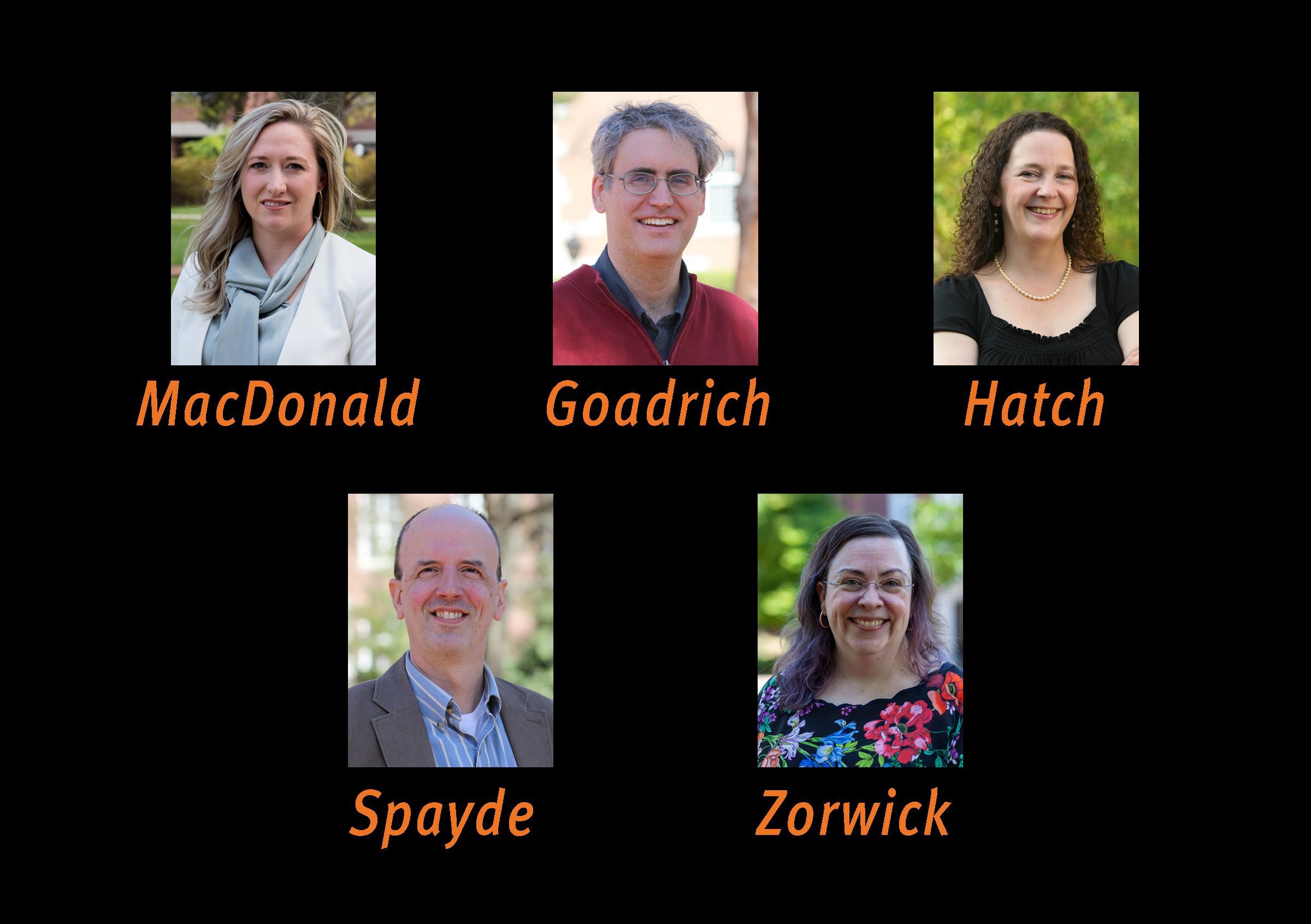Project will support STEM-focused students from economically
limited backgrounds

Faculty members leading the current S-STEM initiative at Hendrix include Principal Investigator Dr. Laura MacDonald and Co-Investigators Drs. Mark Goadrich, Courtney Hatch, Damon Spayde, and Leslie Zorwick.
CONWAY,
Arkansas (March 26, 2024)—Hendrix College has been awarded a six-year, $2,500,000 Scholarships in
Science, Technology, Engineering, and Mathematics (S-STEM) grant from the
National Science Foundation (NSF).
The grant will provide up to $15,000
in scholarships annually to students from economically limited backgrounds to
pursue degrees in STEM fields at Hendrix. As part of the program, students will
have the opportunity to engage in a structured learning community that builds
lifelong connections and will receive summer stipends to pursue research and
internships. Participants will also be engaged in a community-based project
facilitated through Hendrix College and the Arkansas Regional Innovation Hub to face student-identified
challenges that can be addressed through scientific solutions.
“We are honored to be included in
this incredible opportunity with Hendrix College. This collaboration
demonstrates the power of community working together to provide resources for
advancements in STEM,” said Innovation Hub Director Errin Stanger. “The
commitment to serving economically limited individuals is directly in line with
our mission.”
A main goal of the funding is to
help students identify ways in which they can bring their talents and ideas
forward to solve problems in their local communities, particularly in regions
of Arkansas with limited infrastructure and access to broadband internet. The
grant also provides funding for faculty workshops and development to position
them to most effectively support the STEM Scholars through intentional advising
and mentorship.
The six-year program will be
available to three cohorts of 10 students who plan on pursuing the STEM
disciplines including biology, chemistry, physics, mathematics and computer
science, biochemistry and molecular biology, and chemical physics. While all students
who meet financial criteria are eligible, the College is especially interested
in recruiting students from the rural regions of Arkansas and surrounding
states and welcomes students who are first-generation and who are otherwise
underrepresented in science.
The current grant builds on a
successful effort by Drs. Laura MacDonald ’09, Courtney Hatch ’00, Leslie
Zorwick, former faculty members Drs. Matthew Moran and Dionne Jackson ’96, and Director
of Career Services Leigh Lassiter-Counts ’01. Funding from the last grant supported 21 students with scholarships, advising, research,
internships, and programming opportunities. The program graduated 95% of its
student participants, who completed a total of more than 44 research projects,
gave 26 presentations at regional and national conferences, and resulted in four
peer-reviewed publications with student authors.
“It was such a privilege to work with the 21 students
in our last project,” said Associate Professor
of Biology Laura MacDonald, who serves as primary investigator for the grant.
“They persevered through the COVID-19 pandemic and really came together as a
group to support one another, which contributed to their overall success. They
left such an impact on our grant team, and their experiences and feedback were
central to how we framed our new proposal.”
The current project is spearheaded
by MacDonald, alongside co-investigators Professor of Chemistry Courtney Hatch,
Professor of Physics Damon Spayde, Professor of Mathematics and Computer
Science Mark Goadrich, and Professor of Psychology Leslie Zorwick.
“It’s an honor to lead such an amazing group of
colleagues, each accomplished, in the upcoming work, the major focus of which
is to make a broader impact on Arkansas,” MacDonald added. “So often, we see
talented students either leave the sciences or leave the state to pursue
professional opportunities in more affluent areas of the country, and we need
to be focusing on how we can help them pursue a future in their own
communities. Arkansas is an amazing place to live and learn, and we need
bright, talented individuals to steer us into the future. We are excited to be
part of that process.”
NSF support for S-STEM at Hendrix College recognizes the
College’s spectacular academic outcomes and success in preparing students for
an independent professional journey, as described in the final evaluation of
the previous funding cycle for the project, said Hendrix President Karen
Petersen.
“A residential liberal arts
education allows students and faculty to develop meaningful mentoring
relationships, which not only prepares students for academic success but also for
life beyond the classroom or the lab,” said Petersen. “Our students,
particularly those who are first-generation students or from areas where
college-going is not the norm, benefit from having multiple advocates across
campus. Those in the S-STEM program also learn, through experimentation, that
failure is a crucial part of learning and growth, which prepares them well for
a lifetime of learning. In many respects, S-STEM exemplifies our approach to
education as reflected in our motto, ‘Unto the Whole Person.’”
About Hendrix College
Founded in 1876, Hendrix College is
featured in Colleges That Change Lives: 40 Schools That Will Change the Way You
Think About Colleges and celebrated among the country’s leading liberal arts
colleges for academic quality, engaged learning opportunities and career
preparation, vibrant campus life, and value. The Hendrix College Warriors
compete in 21 NCAA Division III sports. Hendrix has been affiliated with the
United Methodist Church since 1884. Learn more at www.hendrix.edu.
“… Through engagement that links the
classroom with the world, and a commitment to diversity, inclusion, justice,
and sustainable living, the Hendrix community inspires students to lead lives
of accomplishment, integrity, service, and joy.”
—Hendrix College Statement of Purpose